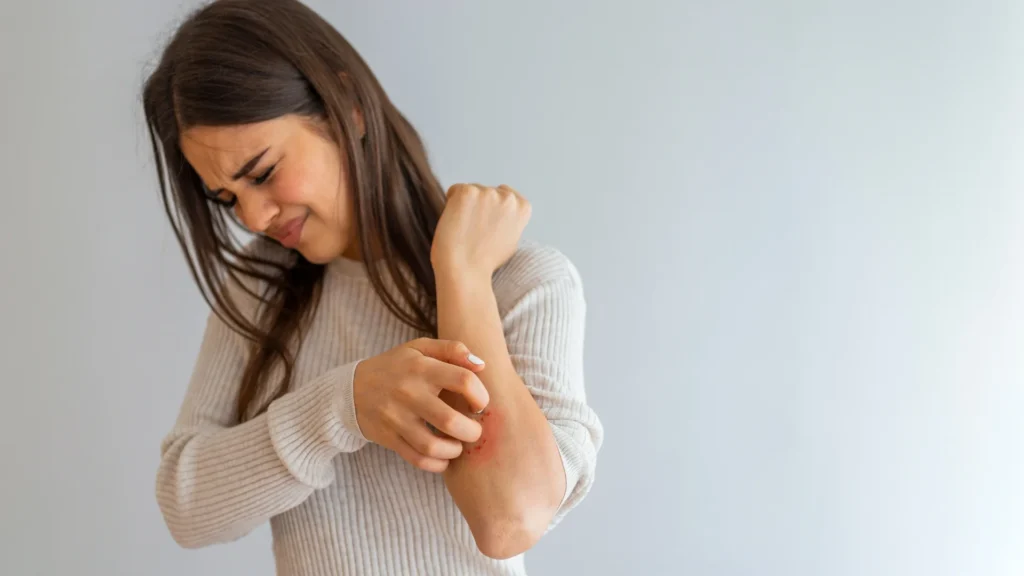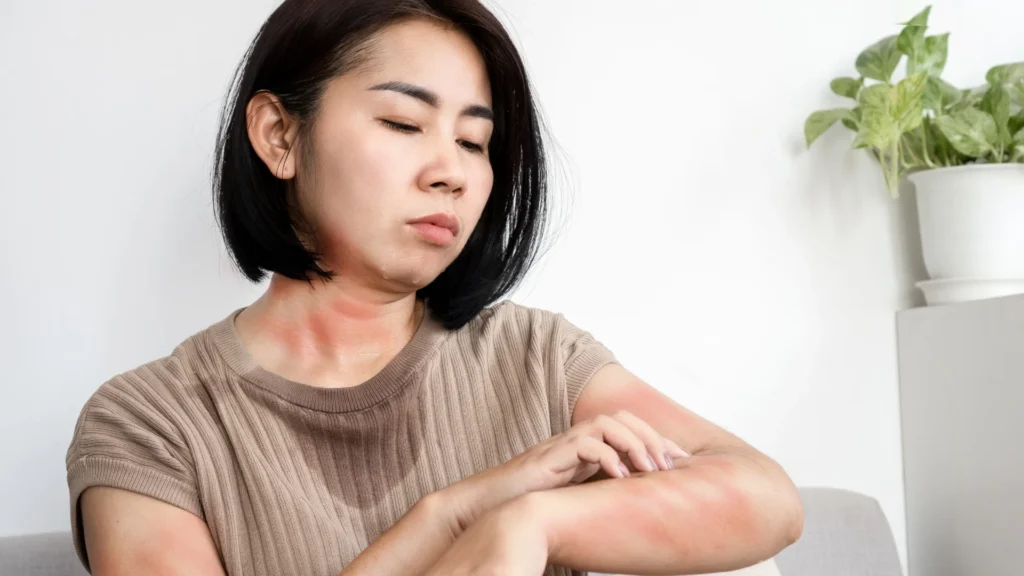Have you ever noticed your skin becoming unusually dry, red, or itchy after giving birth? You might be experiencing postpartum eczema. This skin condition can be an unexpected and frustrating challenge for new mothers.
Imagine trying to care for your newborn while dealing with relentless itching and discomfort. The joy of motherhood can quickly become overshadowed by the struggle to manage your skin. Postpartum eczema is more common than you might think, and understanding it is the first step towards finding relief.
In this article, we’ll explore what postpartum eczema is, why it happens, and how you can manage it effectively. Whether you’re a new mom or someone supporting one, this guide will provide valuable insights to help navigate this condition.
What is Postpartum Eczema?

Postpartum eczema is a type of eczema that occurs after giving birth. This skin condition, also known as atopic dermatitis, involves itchy, inflamed, and dry skin. It can be particularly challenging for new mothers who are already dealing with the demands of caring for a newborn.
How Postpartum Eczema Differs from Other Types of Eczema
While eczema can occur at any stage of life, postpartum eczema is specifically triggered by the hormonal changes and stress that accompany childbirth. Unlike other forms of eczema, postpartum eczema often appears in areas that are frequently exposed to irritants, such as the hands, face, and nipples.
Common Symptoms
- Itchy and red patches of skin
- Dry and scaly areas
- Inflamed and swollen skin
- Cracked or bleeding skin in severe cases
Why It Happens
The primary cause of postpartum eczema is the dramatic shift in hormones after childbirth. During pregnancy, estrogen levels are high, which can sometimes improve eczema symptoms. After delivery, these hormone levels drop sharply, potentially leading to flare-ups. Additionally, the stress and sleep deprivation that come with caring for a newborn can exacerbate the condition.
Areas Commonly Affected
| Area | Description |
|---|---|
| Hands | Frequent washing can dry out the skin |
| Face | Sensitive skin may react to hormonal changes |
| Nipples | Breastfeeding can cause irritation and dryness |
| Neck | Hormonal changes can lead to flare-ups |
Understanding postpartum eczema is the first step in managing it effectively. By recognizing the symptoms and knowing why it occurs, new mothers can take proactive steps to treat and alleviate their discomfort.
What Causes of Postpartum Eczema?

Postpartum eczema can be frustrating and uncomfortable, especially for new mothers. Understanding the causes can help in managing and preventing flare-ups.
Hormonal Changes
After giving birth, a woman’s hormone levels change dramatically. During pregnancy, estrogen levels are high, which can sometimes improve eczema symptoms. Once the baby is born, estrogen and progesterone levels drop sharply. This sudden change can weaken the skin barrier, making it more prone to dryness and irritation.
Stress
Caring for a newborn is a joyful but stressful experience. The lack of sleep, constant feedings, and overall adjustment to a new routine can increase stress levels. Stress is a known trigger for eczema, as it can weaken the immune system and exacerbate skin conditions.
Frequent Handwashing
New mothers often wash their hands more frequently to care for their baby. This constant washing can strip the skin of its natural oils, leading to dryness and irritation. Using harsh soaps or detergents can make the situation worse.
| Cause | Description |
|---|---|
| Hormonal Changes | Sudden drop in estrogen and progesterone levels weakens the skin barrier. |
| Stress | Increased stress from caring for a newborn can trigger eczema flare-ups. |
| Frequent Handwashing | Constant washing removes natural oils, causing dryness and irritation. |
Immune System Changes
During pregnancy, the immune system shifts to protect the fetus. After childbirth, it takes time for the immune system to return to its normal state. This transition can make the skin more sensitive and prone to eczema.
Genetic Predisposition
If you have a family history of eczema, asthma, or hay fever, you are more likely to develop postpartum eczema. Genetics play a significant role in the likelihood of experiencing this condition.
Understanding these causes can help new mothers take proactive steps to manage their skin health. By recognizing the triggers, they can implement strategies to reduce flare-ups and maintain healthier skin.
Symptoms of Postpartum Eczema

Postpartum eczema can be a challenging condition for new mothers, especially when dealing with the demands of a newborn. Recognizing the symptoms is crucial for managing and treating this skin condition effectively.
Common Symptoms
Postpartum eczema presents with a variety of symptoms that can vary in severity. Here are some of the most common signs to look out for:
- Itchy Skin: Persistent itching is often the first and most noticeable symptom.
- Redness: Affected areas may appear red and inflamed.
- Dryness: The skin can become extremely dry, leading to flakiness and rough patches.
- Swelling: Inflammation can cause the skin to swell.
- Cracked Skin: Severe dryness can result in cracks, which may bleed or ooze.
- Rashes: Red or brownish-gray patches, especially on the hands, feet, ankles, wrists, neck, upper chest, eyelids, and inside the bend of the elbows and knees.
Areas Commonly Affected
Postpartum eczema can appear on various parts of the body. Here are the areas most commonly affected:
| Area | Description |
|---|---|
| Hands | Frequent washing can lead to dryness and irritation. |
| Face | Sensitive skin may react to hormonal changes. |
| Nipples | Breastfeeding can cause irritation and dryness. |
| Neck | Hormonal changes can lead to flare-ups. |
| Elbows | Inner bends are prone to dryness and rashes. |
| Knees | Skin folds can become irritated and inflamed. |
Differences in Symptoms Based on Skin Tone
Postpartum eczema can look different depending on your skin tone. It’s important to recognize these variations to ensure proper diagnosis and treatment.
- Lighter Skin Tones: Eczema often appears as red or pink patches.
- Darker Skin Tones: Eczema may show up as darker brown, purple, or gray patches. The skin can also become thickened and darker in the affected areas.
Understanding the symptoms of postpartum eczema is the first step towards effective management. By identifying the signs early, new mothers can seek appropriate treatment and take steps to alleviate their discomfort.
How Long Does Postpartum Eczema Last?

The duration of postpartum eczema varies for each individual. For many new mothers, the condition improves as hormone levels stabilize, which can take several months.
Factors Influencing Duration:
- Hormonal Changes: Hormone levels gradually return to pre-pregnancy states, often leading to improvement in eczema symptoms.
- Stress Levels: Managing stress effectively can help reduce flare-ups and speed up recovery.
- Skincare Routine: Consistent use of moisturizers and gentle skincare products can aid in faster healing.
| Factor | Impact on Duration |
|---|---|
| Hormonal Changes | Symptoms may improve as hormone levels stabilize over several months. |
| Stress Levels | Lower stress can reduce flare-ups and promote quicker recovery. |
| Skincare Routine | Regular moisturizing and gentle products can help heal the skin faster. |
While some mothers may see improvement within a few months, others might experience symptoms for a longer period. It is essential to follow a proper skincare routine and consult a healthcare provider if symptoms persist.
Postpartum Eczema Treatment Options

Managing postpartum eczema involves a combination of treatments to reduce symptoms and prevent flare-ups. Here are some effective options:
Topical Treatments
Moisturizers and Emollients
Keeping your skin moisturized is crucial. Use fragrance-free, hypoallergenic moisturizers to restore moisture and repair the skin barrier. Apply these immediately after bathing and throughout the day as needed.
Steroid Creams
Topical steroids can reduce inflammation and itching. Use them as directed by your healthcare provider to avoid potential side effects like skin thinning and discoloration.
Calcineurin Inhibitors
These non-steroidal creams, such as tacrolimus and pimecrolimus, can help reduce inflammation and are safe for long-term use.
| Topical Treatment | Description |
|---|---|
| Moisturizers | Fragrance-free, hypoallergenic to restore moisture. |
| Steroid Creams | Reduce inflammation and itching; use as directed. |
| Calcineurin Inhibitors | Non-steroidal, reduce inflammation, safe for long-term use. |
Phototherapy
Narrowband UVB Therapy
This treatment involves exposing the skin to ultraviolet light under medical supervision. It can reduce inflammation and improve skin health. Phototherapy is often recommended when topical treatments are not effective.
Medications
Antihistamines
These can help reduce itching, especially at night. They are available over-the-counter or by prescription.
Immunosuppressants
In severe cases, medications like cyclosporine or methotrexate may be prescribed to reduce immune system activity and control eczema.
| Medication | Description |
|---|---|
| Antihistamines | Reduce itching, especially at night. |
| Immunosuppressants | Used in severe cases to control immune system activity. |
Home Remedies and Lifestyle Changes
Cool Compresses
Applying a cool, damp cloth to the affected areas can help reduce itching and inflammation. Make sure to wrap the compress in a towel to avoid direct contact with the skin.
Stress Management
Stress can trigger eczema flare-ups. Practice stress-reducing activities like meditation, yoga, or deep breathing exercises. Taking time for self-care is essential for both your mental and physical health.
Proper Hygiene
Maintain regular hygiene but avoid harsh soaps or fragrances that can dry out your skin. Opt for gentle, moisturizing cleansers.
| Home Remedy | Description |
|---|---|
| Cool Compresses | Reduce itching and inflammation. |
| Stress Management | Activities like meditation and yoga to reduce stress. |
| Proper Hygiene | Use gentle, moisturizing cleansers. |
When to See a Doctor
If your postpartum eczema is severe, persistent, or interfering with daily life, it’s important to consult a healthcare provider. They can offer a personalized treatment plan and prescribe medications if necessary.
Managing postpartum eczema requires a comprehensive approach that includes topical treatments, medications, and lifestyle changes. By understanding and utilizing these options, new mothers can find relief and maintain healthier skin.
How to manage Postpartum Eczema at Home

Managing postpartum eczema at home involves a combination of skincare routines, lifestyle changes, and practical tips to alleviate symptoms and prevent flare-ups.
Skincare Routine
Moisturize Regularly
Keeping your skin hydrated is essential. Use fragrance-free, hypoallergenic moisturizers multiple times a day, especially after bathing. Look for products containing mineral oil or petrolatum to lock in moisture.
Gentle Cleansing
Choose mild, soap-free cleansers to avoid stripping your skin of natural oils. Wash with lukewarm water instead of hot water, which can dry out your skin.
Avoid Irritants
Steer clear of products with fragrances, dyes, or harsh chemicals. Opt for hypoallergenic and dermatologist-recommended products.
| Skincare Tip | Description |
|---|---|
| Moisturize Regularly | Use fragrance-free, hypoallergenic moisturizers multiple times a day. |
| Gentle Cleansing | Choose mild, soap-free cleansers and wash with lukewarm water. |
| Avoid Irritants | Avoid products with fragrances, dyes, or harsh chemicals. |
Lifestyle Changes
Stress Management
Stress can trigger eczema flare-ups. Incorporate stress-reducing activities like meditation, yoga, or deep breathing exercises into your daily routine. Taking time for self-care is crucial for both your mental and physical health.
Healthy Diet
Nourish your body with a balanced diet rich in omega-3 fatty acids, antioxidants, and vitamins. Foods like salmon, flaxseeds, berries, and leafy greens can support skin health and reduce inflammation.
Stay Hydrated
Drink plenty of water throughout the day to keep your skin hydrated from the inside out.
| Lifestyle Change | Description |
|---|---|
| Stress Management | Incorporate meditation, yoga, or deep breathing exercises. |
| Healthy Diet | Eat foods rich in omega-3 fatty acids, antioxidants, and vitamins. |
| Stay Hydrated | Drink plenty of water throughout the day. |
Practical Tips
Cool Compresses
Applying a cool, damp cloth to the affected areas can help reduce itching and inflammation. Make sure to wrap the compress in a towel to avoid direct contact with the skin.
Proper Hygiene
Maintain regular hygiene but avoid harsh soaps or fragrances that can dry out your skin. Opt for gentle, moisturizing cleansers.
Breastfeeding Tips
If you experience nipple eczema, keep the area clean and moisturized. Use hypoallergenic lanolin or other safe moisturizers between feedings. Change breast pads frequently to prevent irritation.
| Practical Tip | Description |
|---|---|
| Cool Compresses | Reduce itching and inflammation with a cool, damp cloth. |
| Proper Hygiene | Use gentle, moisturizing cleansers and avoid harsh soaps. |
| Breastfeeding Tips | Keep nipples clean and moisturized; change breast pads frequently. |
Managing postpartum eczema at home requires a consistent skincare routine, lifestyle adjustments, and practical tips to alleviate symptoms. By incorporating these strategies, new mothers can find relief and maintain healthier skin.
How to Prevent Flare-Ups

Preventing postpartum eczema flare-ups involves identifying triggers and maintaining a consistent skincare routine.
Identify Triggers:
- Track what causes your skin to react
- Common triggers include certain foods, stress, harsh soaps, and weather changes
Establish a Skincare Routine:
- Moisturize daily with fragrance-free products
- Use gentle, hypoallergenic cleansers
- Avoid hot showers; opt for lukewarm water
Manage Stress:
- Practice relaxation techniques like deep breathing or meditation
- Get enough sleep when possible
- Ask for help with baby care to reduce stress
Prevention is key. By avoiding triggers and taking care of your skin, you can reduce the frequency and severity of flare-ups.
How does Postpartum Eczema Impact Breastfeeding?

Postpartum eczema can affect breastfeeding, especially if it appears on the nipples. This can cause discomfort and make feeding challenging.
Nipple Care:
- Use emollients to keep the skin moisturized. Apply them after feeding and wait 30 minutes before the next feed to allow absorption.
- Topical steroids can be used if prescribed. Apply them right after a feed and wait at least an hour before the next one. Wash the area with an emollient before feeding.
Breastfeeding Tips:
- Ensure proper latch to avoid additional irritation.
- Change breast pads frequently to keep the area dry.
- Avoid excessive washing, which can dry out the skin further.
| Tip | Description |
|---|---|
| Use Emollients | Moisturize after feeding; wait 30 minutes before the next feed. |
| Topical Steroids | Apply after feeding; wait an hour before the next feed. |
| Proper Latch | Ensure baby latches correctly to avoid irritation. |
| Change Breast Pads | Keep the area dry by changing pads frequently. |
| Avoid Excessive Washing | Prevent further drying by not over-washing the nipples. |
Managing eczema effectively can make breastfeeding more comfortable for both mother and baby.
How Do You Get Rid of Stress-Induced Eczema?

Managing stress-induced eczema involves reducing stress and taking care of your skin. Here are some effective strategies:
Stress Management:
- Practice Mindfulness: Techniques like meditation and deep breathing can help calm your mind and reduce stress.
- Stay Active: Regular exercise, such as walking or yoga, can lower stress levels and improve overall well-being.
- Get Enough Sleep: Aim for at least 7 hours of sleep each night to help your body recover and reduce stress.
Skincare Routine:
- Moisturize Regularly: Use fragrance-free, hypoallergenic moisturizers to keep your skin hydrated.
- Gentle Cleansing: Choose mild, soap-free cleansers to avoid irritating your skin.
- Avoid Triggers: Identify and avoid products or situations that cause flare-ups, such as harsh soaps or extreme temperatures.
| Strategy | Description |
|---|---|
| Practice Mindfulness | Meditation and deep breathing to calm the mind. |
| Stay Active | Regular exercise like walking or yoga. |
| Get Enough Sleep | Aim for at least 7 hours of sleep each night. |
| Moisturize Regularly | Use fragrance-free, hypoallergenic moisturizers. |
| Gentle Cleansing | Choose mild, soap-free cleansers. |
| Avoid Triggers | Identify and avoid products or situations that cause flare-ups. |
By managing stress and following a consistent skincare routine, you can reduce the frequency and severity of stress-induced eczema flare-ups.
Take Control of Your Postpartum Eczema

Postpartum eczema can be a challenging condition, but understanding its causes, symptoms, and treatments can help you manage it effectively. By maintaining a consistent skincare routine, identifying and avoiding triggers, and using appropriate treatments, you can reduce flare-ups and discomfort.
Remember to moisturize regularly, use gentle cleansers, and manage stress through relaxation techniques. If you experience eczema on your nipples, take extra care to keep the area moisturized and dry, and seek medical advice if needed.
Don’t let postpartum eczema overshadow the joy of motherhood. Take proactive steps to care for your skin and seek support when necessary. If you have persistent or severe symptoms, consult a healthcare provider for personalized advice and treatment options.
Your skin health is important. Take action today to manage your postpartum eczema and enjoy this special time with your baby.
Today we talked about Postpartum Eczema. Here are some other articles you might be interested in:
Healthy Eating for Two: How to Build Effective Pregnancy Diet
Breastfeeding as a Working Mother: What you need to know
Postpartum Diarrhea and How to Manage it
How to deal with Postpartum Hemorrhoids
How to deal with Postpartum Headaches
What is a Postpartum Pain Relief Spray?



